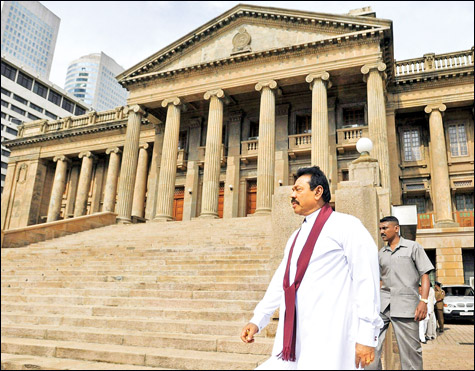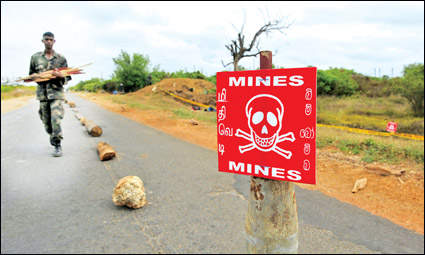Post-Election Sri Lanka and the road ahead
Professor Mahinda Werake
However, an emergence of a new political culture in which unity and
harmony instead of division and conflict are emphasized is essential for
it to be successful. Time has come for Sri Lanka’s political leaders to
put the country first instead of their narrow political interests.
|

President and Parliament, the development journey is a joint
task. File photo. |
They need to abandon ethnic and political differences and work
together for the well- being of the people of Sri Lanka and usher a
bright future for them. In that context, it is heartening to note that
President Rajapaksa has already taken the initiative by calling the
people to shed their differences and rally behind him so that the new
Government could take on the gigantic task of rebuilding the country
devastated by three decades of war and conflict.
In the same token, it is important that the Government also treat the
opposition with respect and be open to their constructive criticisms.
Even though the Opposition has significantly weakened after the
election, the key role of the Opposition in a democracy has to be
recognized. The decision of the Government to allow DNA Leader General
Sarath Fonseka’s entry into the Parliament is a correct step in that
direction.
Combat corruption
The President’s decision to reduce the size of the Cabinet is also a
positive sign which shows that he wants to stop wastage and ready to
work for the interest of the country. Hopefully, the new Cabinet will
work with efficiency and support the President in the nation building
effort. The selection of D M Jayaratne, a man from the rural heartland
of Sri Lanka as the new Prime Minister can be considered an indication
of President’s desire to serve the interests of the common man and rural
Sri Lanka.
During the recent elections, the strength of the UPFA came mostly
from rural areas and consequently it is not surprising that development
efforts of the new Government would focus on the rural sector which has
been relatively neglected by the concentration of most of the economic
activity within the urban areas of the Western Province.
It is time to take the torch of development to the other provinces,
particularly to the war battered North and East. The appointment of an
Economic Development Minister and placing it in the hands of Basil
Rajapaksa, who is an able political leader and administrator signals
well for a new era of development in Sri Lanka.
The main criticism of the Opposition against the UPFA during the
elections was corruption and the high cost of living. There was the
charge that the country is moving towards an authoritarian rule.
Perhaps, one of the main reasons for the emergence of such
shortcomings and trends was the threat of terrorism and the need on the
part of the Government for an aggressive approach to meet the threat.
However, with ending of terrorism, it is hoped that the Government under
President Rajapaksa would move quickly to address those issues.
Reforms
With an almost two thirds majority in Parliament, the President has
an excellent opportunity to reform the Government according to his
wishes and aspirations of the people and mobilize the Government
machinery effectively to solve peoples’ problems, particularly the high
cost of living.
He has clearly indicated that he wants to share the benefits of
development with the people of the whole country during his second term.
He has also vowed to take steps to end corruption during his second
term. It is hoped that the status of emergency that has existed in the
country for so long would end in the near future paving the way for the
restoration of full democracy.
|

Civilian safety, a priority. File photo |
Elected leaders in many countries, during their second or third
terms, generally turn their attention towards carving a niche for them
in the history of their respective countries. There is a tendency for
the leaders to move away from being a politician to become a statesman.
Even in the case of President Rajapaksa we expect him to follow that
path during his second term. In that process it is hoped that he would
move quickly to rectify deficiencies existed during the previous
administration.
National reconciliation
To achieve peace and stability which are key ingredients for
development, national reconciliation between the majority and the
minorities is essential. In that context, the Government has indicated
its willingness and commitment for a permanent solution to the
North-East problem within the framework of a united Sri Lanka.
Results of the National parties (UPFA and UNP) in the North and East
at the recent elections can be considered an indication of Tamil
peoples’ rejection of separatism and their willingness to integrate and
work with the rest of the country. It seems that the Government has
recognized the importance of devolving power from the centre to the
periphery within a united Sri Lanka.
However, the mechanisms of such devolution, or the means of taking
the Government to the people by empowering them, are yet to be worked
out. Hopefully, anticipated changes to the Government structure would
lead to purposeful devolution of power so that people of Sri Lanka could
live peacefully according to their customs and traditions.
It is the duty of the opposition to support the Government in search
for such a solution which would lead towards national reconciliation. In
the past, the lack of cooperation between the Government and the
Opposition due to political opportunism was the main reason for the lack
of progress in finding an appropriate solution to the North and East
problem.
The new Government would be able to push through reforms leading to a
final resolution of the problem with the support from at least some
Opposition members since it needs only six more members to amend the
Constitution through a two thirds majority in Parliament. Unanimously
electing the Speaker with the support from the Opposition parties may be
considered a good omen for future cooperation between the Government and
the Opposition.
Maintaining law and order in society, is also important if Sri Lanka
is to achieve peace and stability. Law and order in Sri Lanka was
adversely affected by the war and people have been living in fear and
insecurity. In the recent past, violence and crime rate has increased
significantly resulting in lawlessness in the society. The right to live
without fear and intimidation is a basic human right which applies to
both the majority and the minority communities. It can be achieved only
by effective enforcement of the law by relevant authorities.
The recent pronouncement by the Defence Secretary to the effect that
the next war will be launched against crime is most welcome. Also, the
Government and other political leaders need to set an example by strict
adherence to the rule of law. Unfortunately, in the recent past, there
were several occasions when some politicians took the law into their
hands and set a bad example to society undermining the respect for the
law of the land. It is hoped that during the next term, the Government
would take steps to make Sri Lanka a law abiding and disciplined
country.
New vistas
Sri Lanka’s foreign policy is another area which needs a new approach
during the Government’s next term. It should gear towards promoting
cooperation with the Asian region both at the bi-lateral and
multi-lateral level with special emphasis on emerging economic power
houses such as China and India. While expanding on friendly relations
with China, our special relationship with India needs to be further
broadened and strengthened.
There is enough potential to use assistance and resources from both
India and China for Sri Lanka’s economic development. Sri Lanka’s
continued active participation in the SAARC and other regional groupings
are also important. Russia, Eastern Europe and Latin America are
countries that need special attention in giving a new direction to Sri
Lanka’s foreign policy in the future.
A new approach to foreign policy is particularly important in view of
the apparent loss of GSP + privileges in Europe and the strong pro-LTTE
lobbying against the Sri Lankan Government, in the West.
However, such an approach does not mean abandoning Sri Lanka’s
friendly relations with USA and the Western Europe where engagement and
not confrontation should be the focus of Sri Lanka’s foreign policy. New
efforts and strategies to improve and strengthen Sri Lanka’s relations
with those countries need to be undertaken.
However, during the next six years, it is imperative that Sri Lanka
fully explores new economic and political opportunities elsewhere as
well. As the national interest is considered to be the cornerstone of a
country’s foreign policy, Sri Lanka needs to re-evaluate its foreign
policy in terms of its own national interest.
We need to realize that we are a small developing country which needs
the friendship and understanding of all countries in the world and in an
era of increasing globalization, there is no future for a restrictive
foreign policy. While safeguarding our national independence and
preventing undue pressures and interventions from the outside, the next
phase of Sri Lanka’s foreign policy has to be geared primarily towards
promoting country’s economic development. We hope that the new Foreign
Minister will be able to face that challenge successfully.
In addition to improving discipline in our schools and other
institutes of learning (which has deteriorated significantly in the
past), our education system has to be reformed with the goal of ending
divisiveness in the country and promoting national reconciliation and
integration. It needs to focus on ethnic harmony by highlighting
similarities between the Sinhalese majority and the Tamil cultures and
how they have enriched each other in the past.
Unfortunately, there are some who emphasize their differences rather
than similarities and give prominence to political conflicts that
occurred between Sinhalese and Tamil rulers.
While recognizing the unique features in each others culture and
heritage, education should explore ways and means of integrating the
majority community with the minorities. Accordingly, a genuine effort
should be taken to make the students understand and respect each others’
cultures and learn to celebrate the cultural diversity among us.
In addition to promoting teaching spoken English as a link language
as already proposed by the Government, facilities should be made
available for Sinhalese children to learn Tamil and Tamil speaking
children to learn Sinhalese.
Needless to say that such an effort would go a long way in building
an inclusive society and thereby fostering a Sri Lankan identity which
we desperately need to march successfully towards peace and prosperity
in the future. It is hoped that the new Government under the able and
pragmatic leadership of President Rajapaksa, would take the country in
that direction. |



